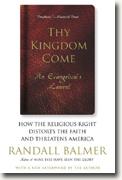
Thy Kingdom Come - An Evangelical’s Lament: How the Religious Right Distorts the Faith and Threatens America by Randall Balmer (2006) - 2 out of 5 stars
If this were a different book, I think I might have liked it. There is a genuine concern in the unholy alliance of many professing evangelicals with the Republican Party, and a good case can be made that the Republican Party has not served as much of a standard bearer for the values that conservative, biblically-minded evangelicals hold (or should hold) dear. A thoughtful discussion of these issues would be welcome. Likewise, a substantive treatment of major public policy issues (in particular, those that often divide left and right) from a distinctly Christian perspective is beneficial and would help move the conversation forward. This book is neither of those things.
As the title says, this is Balmer’s lament at the hijacking of Christianity by the Religious Right to do their political bidding (which he sees as generally coinciding with that of the Republican Party). According to Balmer, the Religious Right, defined as “politically conservative evangelicals who, since the late 1970’s, have sought to exert their influence in political, cultural, and legal matters,” does not represent the views of biblical Christianity and even those of earlier generations of Christians. He regrets the fact that among most outsiders, the term evangelical carries with it connotations of “right-wing,” “Republican,” and this group known as “the Religious Right.” This is indeed true, and regrettable. In mainstream thought, the idea of a bible-believing Christian almost necessitates wholesale approval of George W. Bush and a daily recitation of the pledge of allegiance. This is not true to reality, as Balmer rightly argues, since there are many evangelicals who hold liberal political views and do not find themselves represented by the Religious Right.
While Balmer’s characterization in the book suggests that the stereotype is true to reality for those within the Religious Right (as defined above), I would contend that even here it is incorrect. “Politically conservative evangelical” no more equates to “Republican Party” than “evangelical” equates to “Religious Right.” In fact, as a politically conservative evangelical, I found myself agreeing with Balmer in lamenting the treatment of “evangelical” and “Republican” as synonymous. Balmer makes the book a broad assault on “politically conservative evangelicals” which he equates to the “Religious Right,” but the only punches he ever lands are on those closely aligned with the Republican Party establishment.
Semantics aside, this book is not Balmer’s version of “Why I am a liberal,” or an evangelical defense of liberal political thought. Neither is it a substantive critique of conservative political thought. Rather, it is an attempt to debunk the conservative evangelical viewpoint in six key areas, mainly through anecdotal accounts and ad hominem attacks. Where there is an argument presented on an issue, it rarely diverges from the standard Democratic Party line of reasoning, although there is usually an appeal to Christian belief as the basis. The six key areas are:
- Abortion
- Homosexuality
- Separation of Church and State
- Public Education
- Intelligent Design/Creationism
- The Environment
The book does a great job of pointing out much hypocrisy and even more inconsistent application of professed principles by leaders in the conservative movement. It also demonstrates ways that the Republican establishment has done a good job talking the talk on many issues which conservative evangelicals are genuinely concerned about, but have used those issues to gain votes and advance a different agenda. However, it does little to move the discussion forward with regards to evangelicals and their political positions. After reading the book, I got the impression that Balmer was not really lamenting that most of evangelicalism was aligned with a political party and had used the Bible and Christian values to promote a political agenda, but that it was aligned with the Republican party (as opposed to the Democratic party) and was promoting the wrong agenda. In other words, if the Evangelical Right became the Evangelical Left, there wouldn’t really be an issue.
